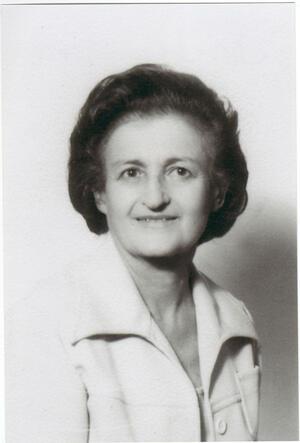Johanna Spector
It was 1973. I was pursuing my doctoral studies at New York University, majoring in Music Education. As part of the course requirements, I was expected to give a piano recital: I chose to present an all-Chinese program composed in the western style. Nixon had just been to Mainland China and anything Chinese was quite newsworthy. I was going to be the pianist who would perform western-style Mainland Chinese music in the Free World for the first time. It was exciting. It was, in fact, a major coup.
The program generated a great deal of interest. I myself was very excited by the enthusiastic reception the music received and thought this material could be an interesting niche for my musical career. One of the panelists for the event, composer Chou Wen-chung, suggested that I get in touch with Dr. Johanna Spector, who was then the president of the Society for Asian Music.
I telephoned Dr. Spector and asked if I could meet with her, and she very kindly agreed. On the appointed day, I introduced myself and explained the situation and my interest in "promoting" newly available Chinese music. With perfect serenity, she looked me in the eye and said, "But you don't look Chinese." I was taken aback; I wasn't even sure what she meant by that statement.
"What is your ethnic background?" Dr. Spector asked. I told her I was Armenian. "It would be much better if you would explore your own roots. I am sorry, I can't help you," she replied. I was crushed. Crestfallen, I returned home. Yet, she intrigued me as a person – as a human being. This tiny lady with gentle eyes but with a piercing gaze had touched me deeply. I wanted to know her better. So I called her back and invited her over for dinner. She accepted to have tea with me instead.
Over tea, Spector explained to me why she'd had to turn me down. She could understand and imagine my deep disappointment and recounted her experience in this field. In the late forties, after spending some time in Palestine, collecting innumerable Jewish folk songs, she had arrived in this country and approached Curt Sachs for advice regarding her desire to study Jewish music.
According to Spector (or "Gania," as her friends called her) Sachs dismissed the idea of exploring Jewish music and suggested instead that she concentrate on a topic that was related directly to western culture. "Trying to make a career of Jewish music," he said, "would be a waste of time."
Though heartbroken, Spector persisted and finally found an ally in Dr. Eric Werner who steered her toward the Hebrew Union College in Cincinnati, where she received her doctorate in Jewish music. Upon her return to New York, she founded the department of Ethnomusicology at the Jewish Theological Seminary in New York, where she taught for many years and was head of the department.
Dr. Spector and I became close friends. I admired her many laudable qualities, especially her sense of loyalty. If she believed in you, she stood by you and defended you to the end.
She was also generous. If you were raising funds for a personal project, Spector was the first to make a donation. Not only was she generous in material ways, but she was lavish with her time and her knowledge. She was likewise very generous with her possessions and would always lend her valuable music scores to those who needed them.
Dr. Spector always seemed happy and was full of laughter. Despite her tragic past, she knew how to enjoy life and made sure that you enjoyed it along with her.
At the same time, she was principled. Deeply religious, her tenets in life were molded by her profound belief in the teachings of the Bible. She was also unbending: a determined lady who would brook no action that violated her principles.
One of her pet words was "proper": things should be done properly, one should behave properly, one should treat others properly.
Oh, yes, Gania – Dr. Johanna Spector – was a very proper lady.




You could add to the article Dr. Spectors book, published in postwar Vienna in 1947: "Ghetto- und KZ-Lieder aus Lettland und Litauen. Aufgezeichnet, gesammelt, erklÌÄå_rt und mit Begleitung versehen.- Printed and distributed by AJDC. Austria"
You could add to the article Dr. Spectors book, published in postwar Vienna in 1947: "Ghetto- und KZ-Lieder aus Lettland und Litauen. Aufgezeichnet, gesammelt, erklÌÄå_rt und mit Begleitung versehen.- Printed and distributed by AJDC. Austria"